Solar eclipse of August 24, 2063
| Solar eclipse of August 24, 2063 | |
|---|---|
 Map | |
| Type of eclipse | |
| Nature | Total |
| Gamma | 0.2771 |
| Magnitude | 1.075 |
| Maximum eclipse | |
| Duration | 349 sec (5 m 49 s) |
| Coordinates | 25°36′N 168°24′E / 25.6°N 168.4°E |
| Max. width of band | 252 km (157 mi) |
| Times (UTC) | |
| Greatest eclipse | 1:22:11 |
| References | |
| Saros | 136 (40 of 71) |
| Catalog # (SE5000) | 9649 |
A total solar eclipse will occur on August 24, 2063. A solar eclipse occurs when the Moon passes between Earth and the Sun, thereby totally or partly obscuring the image of the Sun for a viewer on Earth. A total solar eclipse occurs when the Moon's apparent diameter is larger than the Sun's, blocking all direct sunlight, turning day into darkness. Totality occurs in a narrow path across Earth's surface, with the partial solar eclipse visible over a surrounding region thousands of kilometres wide.
Related eclipses[]
Solar eclipses 2062–2065[]
This eclipse is a member of a semester series. An eclipse in a semester series of solar eclipses repeats approximately every 177 days and 4 hours (a semester) at alternating nodes of the Moon's orbit.[1]
| 121 | March 11, 2062 Partial |
126 | September 3, 2062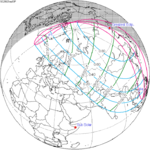 Partial |
| 131 | February 28, 2063 Annular |
136 | August 24, 2063 Total |
| 141 | February 17, 2064 Annular |
146 | August 12, 2064 Total |
| 151 | February 5, 2065 Partial |
156 | August 2, 2065 Partial |
Saros 136[]
Solar Saros 136, repeating every 18 years, 11 days, contains 71 events. The series started with partial solar eclipse on June 14, 1360, and reached a first annular eclipse on September 8, 1504. It was a hybrid event from November 22, 1612, through January 17, 1703, and total eclipses from January 27, 1721, through May 13, 2496. The series ends at member 71 as a partial eclipse on July 30, 2622, with the entire series lasting 1262 years. The longest eclipse occurred on June 20, 1955, with a maximum duration of totality at 7 minutes, 7.74 seconds. All eclipses in this series occurs at the Moon's descending node.[2]
| Series members 29–43 occur between 1865 and 2117 | ||
|---|---|---|
| 29 | 30 | 31 |
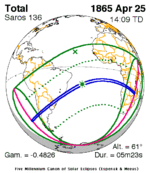 Apr 25, 1865 |
 May 6, 1883 |
 May 18, 1901 |
| 32 | 33 | 34 |
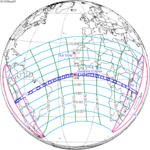 May 29, 1919 |
 Jun 8, 1937 |
 Jun 20, 1955 |
| 35 | 36 | 37 |
 Jun 30, 1973 |
 Jul 11, 1991 |
 Jul 22, 2009 |
| 38 | 39 | 40 |
 Aug 2, 2027 |
 Aug 12, 2045 |
 Aug 24, 2063 |
| 41 | 42 | 43 |
 Sep 3, 2081 |
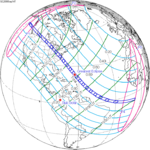 Sep 14, 2099 |
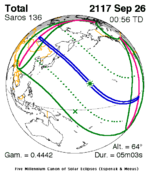 Sep 26, 2117 |
Metonic cycle[]
The metonic series repeats eclipses every 19 years (6939.69 days), lasting about 5 cycles. Eclipses occur in nearly the same calendar date. In addition, the octon subseries repeats 1/5 of that or every 3.8 years (1387.94 days).
| 21 eclipse events between June 12, 2029, and June 12, 2105 | ||||
|---|---|---|---|---|
| June 11–12 | March 30–31 | January 16 | November 4–5 | August 23–24 |
| 118 | 120 | 122 | 124 | 126 |
 June 12, 2029 |
 March 30, 2033 |
 January 16, 2037 |
 November 4, 2040 |
 August 23, 2044 |
| 128 | 130 | 132 | 134 | 136 |
 June 11, 2048 |
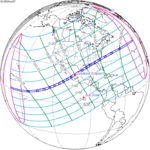 March 30, 2052 |
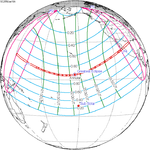 January 16, 2056 |
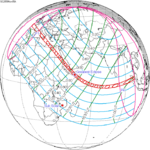 November 5, 2059 |
 August 24, 2063 |
| 138 | 140 | 142 | 144 | 146 |
 June 11, 2067 |
 March 31, 2071 |
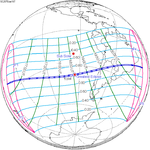 January 16, 2075 |
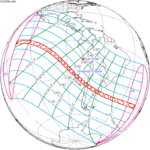 November 4, 2078 |
 August 24, 2082 |
| 148 | 150 | 152 | 154 | |
 June 11, 2086 |
 March 31, 2090 |
 January 16, 2094 |
 November 4, 2097 | |
References[]
- ^ van Gent, R.H. "Solar- and Lunar-Eclipse Predictions from Antiquity to the Present". A Catalogue of Eclipse Cycles. Utrecht University. Retrieved 6 October 2018.
- ^ SEsaros136 at NASA.gov
External links[]
- Total solar eclipses
- 2063 in science
- 21st-century solar eclipses
- Future solar eclipses
- Solar eclipse stubs


